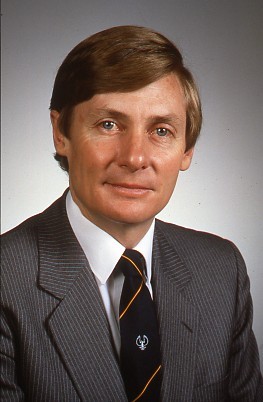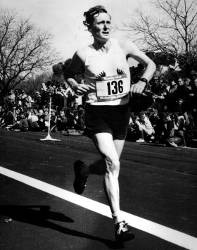Bannon Collection
Aboriginal and Torres Strait Islander people should be aware that items in the Flinders University Library collections may contain images, voices, and names of deceased persons. In some Aboriginal and Torres Strait Islander communities, hearing recordings, seeing images or the names of deceased persons may cause sadness or distress and, in some cases, offend against strongly held cultural prohibitions.
The Bannon Collection represents a rich resource for Australian history at both State and Federal level, including personal letters, photographs, audio-visual material, marginalia, ephemera, speeches and press clippings. It includes official documents from John Bannon’s term as the second-longest serving Premier of South Australia, and other material from his earlier career, as an adviser in the Whitlam Government and as a public servant in SA, as well as his more recent activities as an historian, a Director of the ABC Board, and head of St Mark’s College.
The Dunstan Collection is also housed in Special Collections at Flinders University, and the addition of this unique material means that primary sources relating to public affairs and politics over more than sixty years, and SA’s Labor leadership covering a period from 1967 to 1992, are available for future generations of researchers.
Search the Bannon Collection.
Go to the Bannon Collection in findit@flinders. (Add additional search terms in the search box to search within the collection)

Biography
The Honourable Dr John Bannon, AO, as Premier and Treasurer of South Australia and a leader of the labour movement and Australian Labor Party nationally, played a major role during a period of industrial and social transformation in South Australia in a career in public life from the 1960s. In his early years, prior to entering Parliament, he was a radical student leader, ALP activist, member of the Australian Universities and State debating teams, and professional stage and radio performer. Graduating in law, he was a union advocate, and later an industrial relations and higher education policy advisor to state and federal Governments. After service in the State Parliament he completed a PhD and, as an academic historian, published and lectured mainly on his specialist interest of Australian Federation and Commonwealth/State relations. He was a member of the ABC Board in the 1990s, and Master of St Mark’s College for eight years from 2000. The arts and sports always played an important part in Dr Bannon’s life and this passion is reflected in other activities over the years, both in and out of politics.
The Early Years
John Charles Bannon was born in Bendigo, Victoria in 1943, and was educated at East Adelaide Primary School and St Peters College, where his father was the art master.
He graduated from the University of Adelaide in Arts and Law and was editor of the student newspaper ‘On Dit’ (1964). He was President of the Australian Student Labour Federation (1965-6), the Adelaide University Students Representative Council (1966-7) and the Adelaide University Union (1969–71), and full-time President of the National Union of Australian University Students (1968-69).
Before entering the South Australian Parliament he was industrial advocate for the Australian Workers Union; policy advisor to Clyde Cameron in the Whitlam Government; and Assistant Director of the South Australian Department of Labour & Industry.
Politics
Dr Bannon was elected to the South Australian House of Assembly in 1977, retiring at the 1993 election. He was Minister of Community Development, Arts, Recreation and Sport and Local Government in the Dunstan and Corcoran Governments (1978-9) and the Leader of the Opposition (1979-1982). From 1982 to 1992 he was Premier and Treasurer of South Australia and Minister for State Development and the Arts.
He was National President of the Australian Labor Party from 1988 to 1992.
His administration was marked by a big agenda of social justice policies and new initiatives in health, welfare, the environment, Aboriginal land rights, the arts, public housing, prisons and criminal justice, as well as major public sector administrative reform. Public debt as a proportion of State GSP was substantially reduced during the 1980s and a strong capital works programme pursued.
In 1985 he brought the Formula One Grand Prix to Adelaide.
Initially constrained to oppose development of the world’s largest copper, uranium and gold deposit at Olympic Dam, he was instrumental in changing both State and Federal ALP policy to allow the development to proceed, and in 1988 after much controversy the mine and town of Roxby Downs was opened.
In 1987, the largest defence contract to that time was signed between the Australian Government and the Australian Submarine Corporation after an intensive campaign to establish Adelaide as the prime national site. This decision provided the basis for the major defence industry developments in South Australia.
Despite South Australia outperforming the other states in a number of areas during the 1980s, the national recession of the early 1990s and resulting financial crisis found the State Bank of South Australia exposed to the downturn and support from Treasury to keep it solvent. The Bank was managed by an independent Board, but as Treasurer Bannon took responsibility and after stabilising the situation through two budgets, resigned in September 1992. The bank collapse overshadowed many achievements of the Government.
His expertise and interest in Commonwealth/State relations and Federation led to Dr Bannon’s role as a member of the Expert Advisory Panel for the Department of the Prime Minister’s Reform of the Federation White Paper in 2015.
The Arts
Dr Bannon’s love of the arts was first inspired by his artist father, Charles Bannon AM, although his own chief interest was in theatre. From the age of nine he took roles in radio plays for the ABC, and later acted professionally in radio, TV and stage; and in many amateur stage productions, including the University Footlights Revue.
He took special interest in arts policy and development as Arts Minister and Shadow Minister. After politics he was a Board member for the Adelaide Symphony Orchestra and Australian Exhibitions Touring Agency. From 1994 to 1999 he was a director of the ABC.
Sportsman
Dr Bannon was a keen sports enthusiast as participant, supporter and administrator. At school he captained athletics and the cricket 2nd XI, and played basketball. Later he took over 250 wickets for his cricket club, and was a player life member of the Adelaide Turf Cricket Association. He retained an active role as an administrator at both state and national levels, as a member of the Board of Directors of Cricket Australia and co-chair of its National Indigenous Cricket Council, Board member of the South Australian Cricket Association and a Director of the Adelaide Oval Stadium Management Authority.
He was a keen runner in track, road and cross country events, completing over thirty marathons, locally and abroad.

Native plants and gardening
One of Dr Bannon’s interests was the environment and a passion for Australian native plants dating from his earliest gardens in the 1960s. As Life Members of Trees for Life, he and his wife Angela propagated and planted thousands of seedlings both for landholders in different regions of the State and for their twenty acre block in the Hills. This was a bare stock paddock, but natural re-growth, direct seeding and tube planting have turned it into a park over the course of twenty-five years. Documents relating to this enterprise, to membership of TFL, the Nature Foundation, the Society for Growing Australian Plants and Greening Australia, and to domestic beekeeping, fruit and vegetable growing and backyard bantams are in the Collection. When in Government, his initiatives included the first Act to control clearance of native vegetation, and a massive extension of conservation parks.
Academia
From 2000 Dr Bannon was Master of St Mark’s College at the University of Adelaide, a position he would hold for eight years. The importance and perpetuity of education is a key theme that is carried throughout Bannon’s life: through his university years, political career, teaching roles and as an academic and historian.
He was an Adjunct Professor of Law at the University of Adelaide, a Visiting Research Fellow at Flinders University, and held residential Fellowships at Kings College London and the University of Edinburgh.
Dr Bannon had a strong commitment to lifelong education and learning. Prior to entering Parliament he served on the councils of the University of Adelaide, Sturt College of Advanced Education, the Australian Graduate School of Management, the Trade Union Training Authority, and the WEA.
Latterly he was Chairman of the National Archives of Australia Advisory Council, a member of the Australian Information Advisory Committee, Trustee of the C.A.S. Hawker Memorial Scholarship Fund, President of the History Council of South Australia, and an Honorary Fellow of the Academy of Social Sciences in Australia.
Publications include The Crucial Colony, a monograph; Supreme Federalist, the biography of Sir John Downer, (Wakefield Press, 2009) and the chapter on ‘South Australia and Federation’ in the Centenary Companion on Australian Federation, (Cambridge University Press). He co-edited The New Federalist, the national journal of Federation history.
In 2007 Dr Bannon was awarded the Officer of the Order of Australia Honour “for service to politics and to the South Australian Parliament, to history, particularly through researching and publishing in the subject area of Australian Federation; and to the community through sporting, cultural and welfare organisations".
He passed away on December 13th 2015 in Adelaide.
Conditions of Access
The Bannon Collection is available to bona fide scholars with a genuine research interest. An index of the collection may be accessed via the Library home page.
Applications to use the Collection must be made by submitting an online request form. Enough information must be provided to identify clearly the credentials of the applicant and the use to which the papers will be put, and each application will be individually considered on its merit.
Successful applicants will be advised of suitable times and dates for using the Collection. Access is available by appointment only.
Applicants must provide adequate identification and sign for the files they use. A record will be kept of all files used by each applicant, and a check may be made of each file before and after use.
Copying will be allowed in accordance with the provisions of the Copyright Act 1968 as amended. One copy of each item may be made for research and study. The applicant is responsible for seeking the approval of the copyright owner if use is to be made of the papers in any publication or if they wish to make additional copies.
Any publications in which the material is used must acknowledge The Bannon Collection, Flinders University Library, as a source of information.
Further information
State Records
A considerable amount of material on Dr Bannon's career in politics and public life is available at South Australian State Records.
The relevant series numbers are GRS 850 and GRS 2281.
St Mark's College
Material on Dr Bannon's time as Master of St Mark's College is available from the College Archives. See St Mark's College staff for contact details.
Need help?
Submit an online enquiry about Special Collections
or request an appointment.
![]()
Sturt Rd, Bedford Park
South Australia 5042
Ph: 1300 354 633 (Select 3)
Email: library@flinders.edu.au
CRICOS Provider: 00114A TEQSA Provider ID: PRV12097

